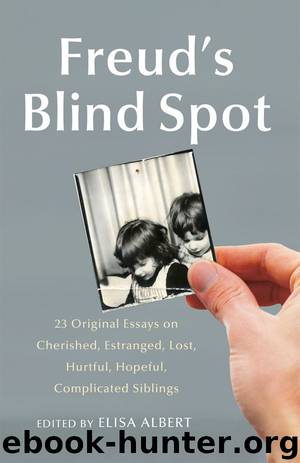Freud’s Blind Spot by Elisa Albert

Author:Elisa Albert
Language: eng
Format: epub
Publisher: FREE PRESS
Published: 2010-07-15T00:00:00+00:00
BEN HERMANN FOREVER
Nellie Hermann
I grew up with three older brothers: Joseph, ten years older; Jeremiah, eight years older; and Ben, five years older. I was shaped by maleness: drawn to it, comforted by it, and kept out of it by something invisible I didn’t understand. When I was ten, Joseph suffered a psychotic break and has been mentally ill ever since. Five years later, Ben died of a brain tumor, this less than a year after we lost my father to the same disease. Now my brother Jeremiah and I are left: he is the brother I always knew the least and with whom I had the least in common.
Do you see my dilemma? I have too much to say. There are so many essays to write and none will separate out. How can I write of my brothers without writing of everything, of all that we had and all that we lost? It’s too much; I’ve only been asked to write one essay, but it seems an impossible task.
The story of my siblings is the story of who I am. I suppose this is true for all of us. How do we write the stories of who we are? If there were only one answer, life would be very, very boring.
I read George Eliot’s The Mill on the Floss recently with a room full of women. At the center of the book is a sibling relationship: the main character, Maggie, and her older brother Tom have a fierce bond that is, though at times troubled, formative and unchangeable. Maggie’s love for Tom as a young girl is obsessive and fawning, and no matter how he behaves toward her as they grow older she continues to seek his approval. A few women in the group found this off-putting and strange, one woman calling it “incestuous”; they were bothered by it and wondered why Maggie didn’t leave off loving her brother so much when he treated her cruelly and seemed to want nothing to do with her. My gut reacted before my head could. I asked these women if they had older brothers; the answer was, across the board, no.
I had the exact opposite response to the sibling relationship in the book, which is to say that I found it one of the more accurate portraits of the younger sister/older brother phenomenon that I have read. I said as much to the group, and across the room a colleague nodded vigorously. She absolutely agreed with me, she said. She has two older brothers.
There is something particular and precious about the obsessive love a younger sister can have for her older brother, and people who have not experienced it themselves often cannot understand it. In this group, those of us who had older brothers argued simply that the way Eliot portrayed it is the way it is, and a gulf between those of us with older brothers and those without opened up and lingered until we moved on to speak of something else.
Download
This site does not store any files on its server. We only index and link to content provided by other sites. Please contact the content providers to delete copyright contents if any and email us, we'll remove relevant links or contents immediately.
The Rules Do Not Apply by Ariel Levy(4948)
Bluets by Maggie Nelson(4541)
Too Much and Not the Mood by Durga Chew-Bose(4324)
Pre-Suasion: A Revolutionary Way to Influence and Persuade by Robert Cialdini(4206)
The Motorcycle Diaries by Ernesto Che Guevara(4078)
Walking by Henry David Thoreau(3948)
Schaum's Quick Guide to Writing Great Short Stories by Margaret Lucke(3368)
What If This Were Enough? by Heather Havrilesky(3302)
The Daily Stoic by Holiday Ryan & Hanselman Stephen(3292)
The Day I Stopped Drinking Milk by Sudha Murty(3184)
The Social Psychology of Inequality by Unknown(3013)
Why I Write by George Orwell(2944)
Letters From a Stoic by Seneca(2785)
A Short History of Nearly Everything by Bryson Bill(2679)
A Burst of Light by Audre Lorde(2586)
Insomniac City by Bill Hayes(2537)
Feel Free by Zadie Smith(2473)
Upstream by Mary Oliver(2384)
Miami by Joan Didion(2362)
